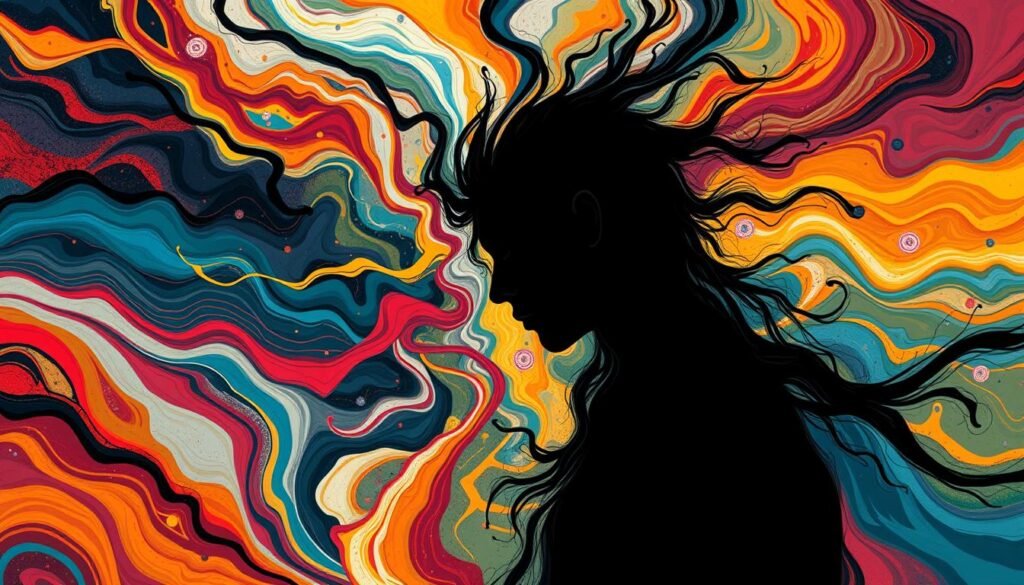Depression is almost three times more likely in people with ADHD than others. This fact shows how closely linked ADHD and depression really are. It proves we need to look closely at their connection.
The link between ADHD and depression is key to understand what those affected go through. It helps in crafting ways to treat these challenges. Acknowledging the role of ADHD in causing depression helps everyone aim for a better well-being.
Key Takeaways
- Depression occurs in nearly half of all children diagnosed with ADHD.
- Effective treatment yields significant improvement in 80-90% of those suffering from depression.
- Suicide is the third leading cause of death among adolescents aged 15 to 24.
- Individuals with ADHD may feel overwhelmed by decision-making, while those with depression often struggle to initiate any activity.
- Comorbid ADHD and depression require individualized treatment approaches for better outcomes.
Understanding ADHD and Depression
Attention deficit hyperactivity disorder, known as ADHD, and depression deeply affect people. Understanding them helps us recognize their challenges. Both disorders can change how a person feels and acts.
Definition of ADHD
ADHD is a disorder that makes focusing and self-control hard. People with ADHD may face problems like:
- Difficulty completing tasks
- Restlessness or fidgeting
- Impulsivity, leading to quick decisions
This condition can make school or work tough. It challenges how individuals handle daily tasks and achieve goals.
Definition of Depression
Depression is more than feeling sad. It’s a deep emotional pain that affects life. The main signs are:
- Feeling very low
- Getting easily irritated
- Feeling tired all the time
Link Between ADHD and Depression
Recent research has looked into how ADHD and depression are connected. Studies show a high rate of adhd depression comorbidity. This means people with ADHD are more likely to get depressed. We will look at the numbers and see how these two conditions often share symptoms.
Statistics about Comorbidity
Alarming stats show a strong link between ADHD and depression. About 30% of kids with ADHD also have mood disorders. Adults with ADHD are three times more likely to be depressed than those without it.
There’s a big jump in the risk of getting depressed in the first year after being diagnosed with ADHD. The risk goes up 6.5 times. This fact points out how crucial early help and support are. To learn more, click on this link.
Common Symptoms Shared by Both Conditions
ADHD and depression share many symptoms such as:
- Trouble concentrating
- Mood swings
- Irritability
- Low energy
- Changes in sleep patterns
The issue of ADHD emotional dysregulation makes it hard to diagnose and manage these conditions. It’s tough to tell if emotional problems are from ADHD, depression, or both. This stresses the need for detailed checks by doctors.
Statistics show that teens with ADHD are ten times more likely to get depressed than those without ADHD. Girls with ADHD face a higher risk of depression than boys. Knowing this helps in taking care of people with both ADHD and depression.
| Statistic | Implications |
|---|---|
| 30% of children with ADHD also have mood disorders | High need for collaborative care and early intervention |
| Depression is three times more common in adults with ADHD | Increased emphasis on adult mental health services |
| 6.5-fold increase in depression risk after ADHD diagnosis | Urgent need for monitoring mental health post-diagnosis |
| 10 times more likelihood of depression in teens with ADHD | Focus on adolescent mental health in school settings |
| Higher depressive symptoms in females than males with ADHD | Need for gender-specific approaches in treatment |
How ADHD Can Cause Depression
The link between ADHD and depression is rooted in deep emotional challenges. Many who have ADHD deal with constant frustration and failure. This often leads to feeling hopeless. This is particularly true for those who find it hard to stay motivated, making daily tasks difficult.
Chronic Frustration and Disappointment
ADHD can make it hard to reach goals and handle everyday activities. This ongoing struggle can make someone feel not good enough and very sad. Trouble with focusing and finishing tasks can make people feel defeated. This can lead to depression, making ADHD related mood issues even worse.
The fight against ADHD symptoms is more than a personal challenge. It can cause deep sadness and dissatisfaction with life.
Impact on Self-Esteem
Low self-esteem is common in those with ADHD. Problems in social settings can make them feel worthless, especially if they struggle with social cues and get negative comments from others. This can reduce self-worth and increase depression risks.
Emotional issues tied to ADHD can make these feelings even stronger. As self-esteem drops, the cycle of ADHD and depression deepens. It’s very important to manage both conditions well.
Why ADHD May Increase the Risk of Depression
ADHD and depression are connected through several key factors. People with ADHD are more likely to get depressed. This is due to genes and the environment they grow up in. Spotting the signs early can help prevent issues later on.
Genetic Factors
A family history of mood disorders can affect those with ADHD. Research shows these individuals might face these issues too. This genetic link means it’s important to watch for depression signs in those with ADHD. Those with ADHD as kids might show early signs of being very sad. This can get worse as they grow up.
Environmental Contributors
The world around someone with ADHD can impact their depression risk. Stress, lack of parental support, and school problems can make things harder. Kids who don’t feel supported at school may struggle more with their symptoms. Because of this, their chances of feeling depressed may increase. Supportive surroundings are crucial for reducing these risks.
Symptoms of ADHD and Depression
It’s crucial to know the symptoms of ADHD and depression for correct diagnosis and treatment. Overlapping symptoms make it hard to tell them apart, causing challenges for doctors and patients. Understanding both the common and unique signs of each condition is key.
Overlapping Symptoms
People with both ADHD and depression share some confusing symptoms. These include:
- Loss of focus – Both conditions can make concentrating hard, affecting everyday life.
- Irritability – Challenges with ADHD can lead to mood swings, similar to those in depression.
- Fatigue – Struggling with ADHD’s demands and depression’s deep tiredness both lead to fatigue.
Many with ADHD feel emotionally troubled, suggesting ADHD can cause depression.
Recognizing Unique Symptoms
Some symptoms specifically point to depression in adults. These unique symptoms include:
- Pervasive sadness – A deep, constant sorrow that doesn’t go away can be crippling.
- Loss of interest – A big drop in enjoying activities once loved is common in adults with depression.
- Suicidal thoughts – ADHD children, especially girls, face a higher suicide risk, showing its serious impact.
These symptoms show how ADHD depression differs in adults from children. It highlights the need for understanding and early care for both groups.
ADHD Cause Depression: The Comorbidity Explained
The link between ADHD and depression is a key topic in mental health. Many with ADHD face emotional issues leading to frustration. Nearly half may develop depression. This shows the complex ADHD and depression link that we must understand well.
About 30 to 40 percent with depression also have ADHD. ADHD symptoms can make depression worse. People with ADHD struggle with controlling their emotions, which can deepen feelings of hopelessness.
Studies show around 68% of women with ADHD also face major depression, unlike 34% without it. This highlights the importance of specific help. Often, ADHD in adults and teens is wrongly labeled as Major Depressive Disorder. This mistake delays the right treatment for 6 to 7 years, keeping people from the help they need.
The risk of suicide is also higher in those with both conditions. 13% of those with ADHD have tried to end their lives. This is four times higher than in people without ADHD. This fact stresses the need for treatments that tackle both ADHD and depression together.
ADHD doesn’t just disappear in adulthood but often starts before any depression. Recognizing and treating ADHD early might lower the chance of later depression. It’s vital to deal with these linked conditions early on.

Treatment Options for ADHD and Depression
Treating ADHD depression requires a combined approach. It’s important to understand the ADHD and depression link to create personalized strategies.
Medication Approaches
Medications are key in treating both ADHD and depression. Stimulants like methylphenidate improve focus. For those not suited to stimulants, non-stimulant options like atomoxetine are available.
To tackle depression, doctors often prescribe SSRIs. They’re effective and safe. Other choices like tricyclic and atypical antidepressants are based on specific symptoms and interactions. A study shows that ADHD medication may reduce the risk of long-term issues.
Psychotherapy and Counseling
Psychotherapy is essential for dealing with ADHD and depression. Cognitive Behavioral Therapy (CBT) helps individuals build coping skills and improve self-esteem. Techniques like Acceptance and Commitment Therapy (ACT) and Interpersonal Therapy (IPT) offer additional support.
These therapies improve emotional well-being and help manage ADHD depression. A coordinated treatment plan ensures personalized care for each individual.
Lifestyle Changes to Combat ADHD and Depression
Making lifestyle changes is crucial in tackling ADHD and depression. These steps can help people manage their mental health better. This leads to a better quality of life. Key areas to focus on are eating well and exercising regularly.
Importance of Healthy Eating
Eating right is key for good brain health and easing ADHD symptoms. Studies show that a diet low in carbs but high in protein helps a lot. It’s especially helpful for those also dealing with anxiety or depression. Choosing foods wisely, like more omega-3s and less caffeine and processed items, nourishes the brain. Keeping track of how food affects you, mood and energy-wise is useful. It helps make better food choices. There are also great tips here on lifestyle changes for tackling depression caused by.
Exercise as a Therapeutic Tool
Exercise isn’t just good for the body but also the mind. Working out daily can boost mood and focus. Try to be active for at least 30 minutes each day. Activities can vary from peaceful walks to more intense exercises. Exercise also helps with sleeping better at night, which is crucial for people with ADHD.
They should aim for at least 7 hours of sleep. Adding natural light to exercise can further improve mood. This is especially true during tough times, like the pre-menstrual phase for women. Outdoor activities have a positive effect on ADHD symptoms, making these lifestyle changes very important. Adopting these habits offers strong support for handling ADHD mood disorders effectively.

Understanding Your Treatment Journey
Navigating your treatment for ADHD and depression needs teamwork. It’s vital to work together with doctors, like therapists and psychiatrists. They create a treatment plan that’s just for you, thinking about how ADHD and depression affect your life.
Working with Healthcare Providers
It’s key to pick the right doctor for managing ADHD and depression. Working with doctors who know a lot about these conditions helps a lot. They can truly understand your symptoms and the problems you face.
You should feel okay telling them about what you are going through. This makes sure they can help you in the best way, aiming for you to get better.
Monitoring Progress
It’s crucial to regularly check how your treatment is going. These check-ins help see if the treatment is working and if any changes are needed. This is very important to make sure the treatment works best for you.
Keeping an open talk with your doctors lets you deal with new issues quickly. This helps make sure your path to feeling better is smooth and filled with hope.
Support for Individuals with ADHD and Depression
A strong support network is key for those with ADHD and depression. It’s important for family and friends to offer emotional and practical help. They help overcome daily challenges. Understanding the ADHD and depression link is vital. It helps loved ones provide the proper support. This makes those suffering feel understood and valued.
Role of Family and Friends
Family and friends are crucial in supporting those with ADHD and depression. They spot signs of trouble, push for treatment, and offer companionship during hard times. Having supportive people around can lessen the loneliness that often comes with these issues. Including family in therapy sessions can improve their grasp of the struggles. This makes for a better environment for healing.
Support Groups and Resources
Being part of support groups gives a sense of belonging to those with ADHD and depression. These groups are great for sharing stories, learning how to cope, and making connections. They meet others who get what they’re going through. Access to resources like educational materials and therapy choices specifically for ADHD and depression can make treatment more effective. For more information on these conditions, check out this link.

| Type of Support | Description |
|---|---|
| Emotional Support | Understanding and compassion from family and friends, reducing feelings of isolation. |
| Practical Help | Assistance with daily tasks and problem-solving strategies. |
| Support Groups | Community engagement, sharing of experiences, and resource referrals. |
| Educational Resources | Information on ADHD and depression to foster understanding among caregivers. |
Seeking Help: When to Consult a Professional
Knowing when to ask for help is key when dealing with ADHD and depression. These conditions come with symptoms that need a professional’s attention. Spotting these signs early can really help in one’s mental health journey.
Recognizing Signs of Depression
Depression symptoms can be quite different for someone with ADHD. Important symptoms to look out for include:
- Persistent feelings of sadness or hopelessness
- Loss of interest in activities once enjoyed
- Significant changes in appetite or weight
- Withdrawal from friends and social activities
- Diminished energy or fatigue
- Difficulty concentrating or making decisions
- Thoughts of self-harm or suicide
If you notice these symptoms getting worse, it might be time to get help. Acting early is crucial in dealing with both ADHD and depression effectively.
Importance of Early Intervention
Tackling ADHD and depression early improves outcomes. Addressing ADHD quickly allows for customized care plans. These might involve medication, therapy, or changes in lifestyle. It’s very important to watch treatments closely, especially in young people.
Not dealing with symptoms can cause more issues, like more severe depression. Depression is a top cause of disability in the U.S. among people 15 to 44. Early treatment can make a big difference in life quality.
| Sign of Depression | Potential Consequences of Delay |
|---|---|
| Persistent sadness | Worsening mood disorders |
| Loss of interest in activities | Increased social isolation |
| Difficulty concentrating | Impaired academic or job performance |
| Fatigue | Reduced motivation and engagement |
| Thoughts of self-harm | Increased risk of severe outcomes |
Knowing the signs and the importance of getting help is vital in fighting ADHD and depression. Early action can lead to a better, happier life.
Conclusion
The link between ADHD and depression is deep and complicated. Many who have ADHD also face depression. Indeed, 44% of people with ADHD will have a depressive episode by age 30. This shows why it’s key to understand how ADHD and depression are connected. Knowing about this link can help us give better support.
There are good treatments available that can help people with these challenges. These include medicines, therapy, and programs like the BEAM program. Lifestyle changes and getting help early are also very important. These steps can make a big difference in managing ADHD and depression.
People dealing with both ADHD and depression should remember they are not alone. Support from loved ones and professionals is vital. It can help them find strength and ways to cope. Understanding ADHD and depression together can lead to a better and happier life.
For more details on mental health, like persistent depressive disorder, visit this site. It talks about how important it is to recognize and diagnose these conditions early.